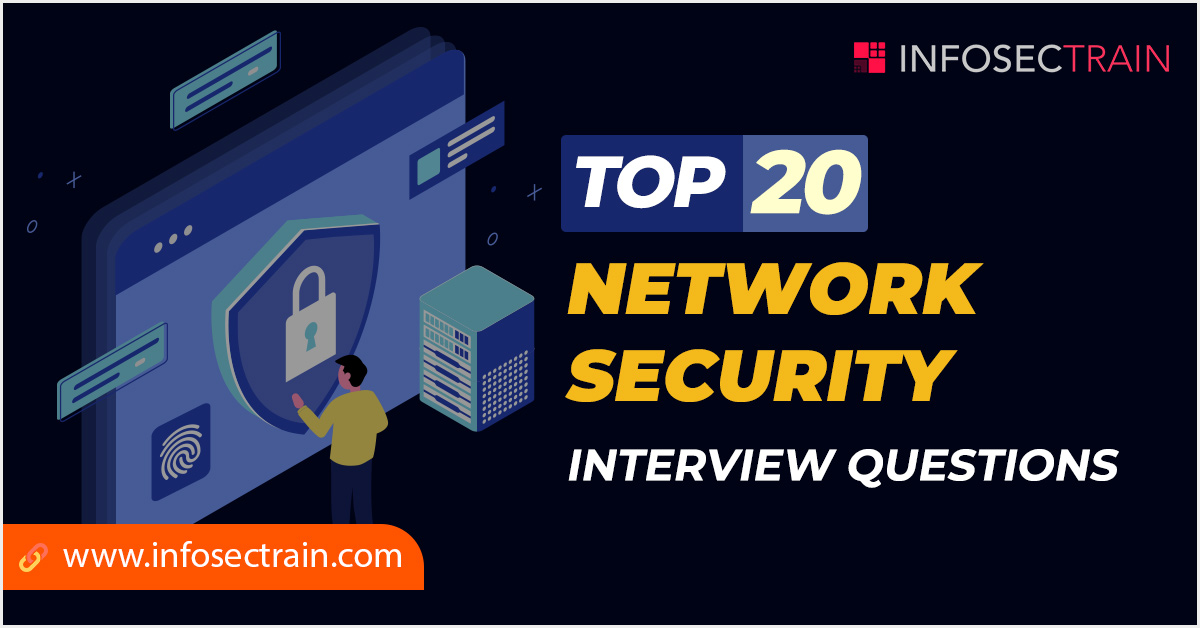Top 20 Network Security Interview Questions

As the world is becoming increasingly dependent on technology, it is important to focus on the need for securing almost every aspect of online data. With the radical growth of the internet and computer networks, data integrity has become one of the critical concerns for enterprises worldwide.
Network security is undoubtedly a significant aspect of operations over the internet, LAN, or other methods. So, enterprises need experts who could address their network security issues and that too in a diverse range of roles. Therefore, candidates often search for common network security interview questions that can help them in their preparations. Here is an outline of the general network security interview questions and answers.
Top Network Security Interview Questions
If you are aspiring to ace your Network security interview in the first go, you need to be prepared well. To help you in your interview preparation, here we bring the most frequently asked network security interview questions. Just go through these questions and answers, and be confident to crack the interview.
- What are the potential outcomes of a network security attack?
The consequences of network security attacks can be irreversible in certain cases. The negative outcomes of such attacks include loss of value with shareholders, reduction of profits, loss of reputation, deterioration of brand value, loss of sensitive information, and proprietary data and reduced trust with customers.
- What is network security?
Network security refers to the policies and practices tailored for prevention and monitoring of unauthorized access, modification, misuse, or denial of network-accessible resources and a computer network.
- Explain the basic working of network security
Network security involves the combination of various layers of safeguards in the network and at the edge. All the network security layers ensure implementation of distinct policies and controls. Authorized users could gain access to network resources with their assigned credentials. However, malicious agents could not carry out any threats or exploits.
- What are the basic objectives of network security?
The foremost goal of network security is to prevent unauthorized access to the network. In addition, network security should also safeguard the privacy and integrity of sensitive user information in the network. Network security also aims at safeguarding the network from external attacks and malware or other types of attacks.
- What are the different functionalities in network security?
The different functionalities of network security continue to evolve with the changing complexity of issues with network security. Some of the notable functionalities of network security include
- Access control
- Application security
- Email security
- Mobile device security
- Web security
- Network segmentation
- Behavioral analytics
- Security information and event management
- Data loss prevention
- What is a VPN?
A VPN or Virtual Private Network ensures encryption of connection from an endpoint to a network, generally over the Internet. In most cases, a remote-access VPN utilizes SSL or IPsec for authenticating communication between network and device.
- What is an Intrusion Prevention System?
An Intrusion Prevention System (IPS) is a specifically tailored system for scanning network traffic to block attacks actively.
- What is the importance of firewalls in network security?
Firewalls help in creating a barrier between a trusted internal network and untrusted external networks, like the internet. Firewalls depend on a set of specific rules for allowing or blocking traffic. A firewall could be either software, hardware, or both.
- Define Phishing.
Phishing is the unethical practice of sending fraudulent messages and communications that apparently appear to be coming from a reputed source.
- How does phishing work?
Phishing attacks generally happen through emails or any other communication method. The message appears to come from a trusted sender and tricks the user into disclosing sensitive information.
Latest Network Security Interview Questions
Now when you have gone through the first set of frequently asked interview questions for the network security interview, here comes the next set. These are the latest network security interview questions, that also you may come across during your interview. So, let’s go through the latest network security interview questions.
- Why is VPN important for network security?
VPN provides an encrypted connection over the internet from a device to a specific network. As a result, users can ensure safe transmission of transmission of sensitive data. VPN is important for network security because it prevents unauthorized people from eavesdropping on traffic.
- What is secure remote access?
Secure remote access enables a safe and secure approach for connecting users and devices remotely with a corporate network. Secure remote access involves VPN technology, which provides formidable methods for user or device authentication.
- What is a DDoS attack?
A DDoS or Distributed-Denial-of-Service attack is the continuous flooding of a central server with frequent data requests. The primary objective of a DDoS attack is to disrupt the target system and business.
The three common DDoS attacks are,
- Application attacks
- Volume-based attacks
- Protocol attacks
- What is Shadow IT?
Shadow IT is the practice of using IT-related software or hardware by an individual or department without informing the organization’s IT or security group.
- What is Network Access Control?
Network Access Control is the process of achieving network visibility and access management through solutions that enable policy enforcement on users and devices in corporate networks.
- What is an information security management system?
An information security management system (ISMS) is a collection of processes and guidelines developed for helping organizations in a scenario involving a data breach.
- What is ransomware?
Ransomware is a variant of malicious software, also referred to as malware. It involves encryption of the target’s data and demand of a ransom for providing access. Payment for such attacks is generally demanded through cryptocurrency.
- What is a proxy firewall?
A proxy firewall is basically a firewall device in the initial stages and provides the gateway from one network to another for a particular application.
- What is Data Loss Prevention (DLP)?
Data loss prevention refers to a combination of products, techniques, practices, and technologies for safeguarding sensitive information from leaking outside the organization.
Conclusion
Therefore, you can notice that you have to cover a broad range of topics for network security interview preparation. The network security interview questions presented here provide you a reliable impression of an actual interview. Most important of all, the above-mentioned questions also reflect on the fundamentals of various aspects of network security. So, aspiring candidates should start their preparations immediately for network security interview questions right now.
Over the long term, network security would become a formidable element in cybersecurity with many career opportunities. Therefore, every aspiring candidate must start developing the foundation for a promising career in network security right away. Once you have gained significant knowledge, it is recommended to validate it with a certification.
We offer network security training course to help candidates prepare for the interview. So, if you’re thinking to achieve a network security certification, enroll into our network security training course and get ready to add a credential to your resume.
However, explore advanced network security interview questions and strengthen your preparations for better performance in your interviews!






 1800-843-7890 (India)
1800-843-7890 (India)